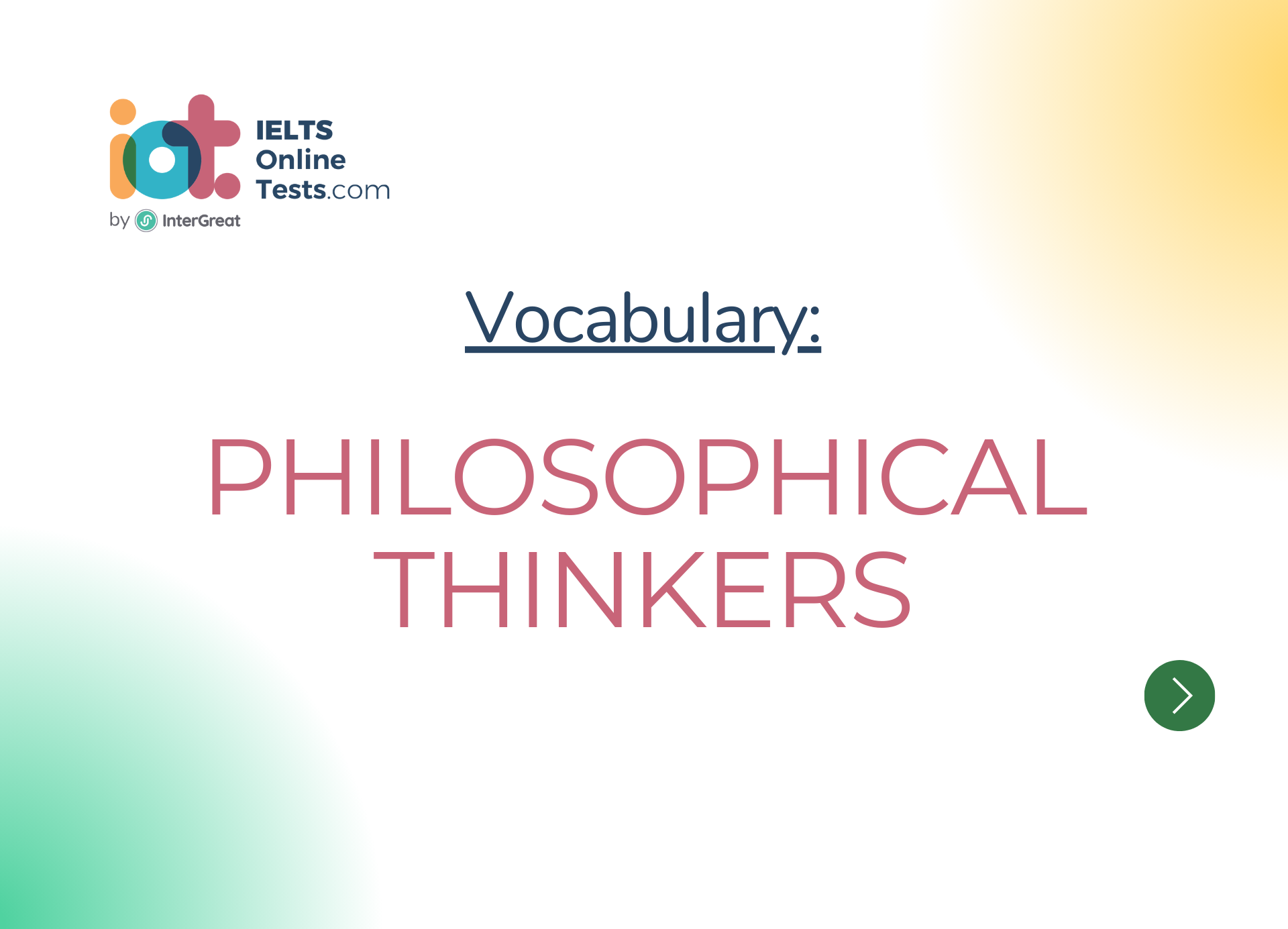
Philosophical thinkers
Below is a detailed list of vocabulary related to "Philosophical Thinkers" that can help you discuss influential philosophers and their ideas in English, suitable for the IELTS band score range of 6.5-8.0:
Aristotle:
Definition: An ancient Greek philosopher, student of Plato, and tutor to Alexander the Great. He made significant contributions to logic, ethics, metaphysics, politics, and more.
Example: Aristotle's philosophy of virtue ethics emphasizes the development of moral character.
Plato:
Definition: An ancient Greek philosopher and student of Socrates. He founded the Academy and explored topics like justice, politics, and the theory of Forms.
Example: Plato's allegory of the cave illustrates the distinction between perceived reality and true knowledge.
Immanuel Kant:
Definition: A German philosopher of the Enlightenment period. He is known for his work on ethics, epistemology, and metaphysics, particularly the Categorical Imperative.
Example: Kant's moral philosophy emphasizes the importance of acting from a sense of duty rather than consequences.
Friedrich Nietzsche:
Definition: A German philosopher who critiqued traditional morality and advocated for the "will to power." He influenced existentialism and postmodern thought.
Example: Nietzsche's concept of the "Ubermensch" explores the idea of transcending conventional values and creating one's own meaning.
Jean-Jacques Rousseau:
Definition: A French philosopher and writer who championed individual freedom and direct democracy. His works influenced political theory and educational philosophy.
Example: Rousseau's "The Social Contract" discusses the relationship between the individual and the state.
John Locke:
Definition: An English philosopher who is considered the father of modern liberalism. He made significant contributions to epistemology and political philosophy.
Example: Locke's idea of the "tabula rasa" posits that individuals are born with a blank slate, and knowledge is derived from experience.
Karl Marx:
Definition: A German philosopher, economist, and political theorist. He is the co-author of "The Communist Manifesto" and the father of Marxism.
Example: Marx's theory of historical materialism analyzes the role of economic factors in shaping societal development.
Sigmund Freud:
Definition: An Austrian neurologist and the founder of psychoanalysis. He explored the unconscious mind and its influence on human behavior.
Example: Freud's concept of the id, ego, and superego explains the dynamics of the human psyche.
Thomas Hobbes:
Definition: An English philosopher who wrote "Leviathan." He is known for his social contract theory and the idea of a "state of nature."
Example: Hobbes argued that a strong central authority is necessary to maintain social order and prevent chaos.
Confucius:
Definition: An ancient Chinese philosopher and educator who emphasized moral values, family, and social harmony in his teachings.
Example: Confucius' "Analects" contains his philosophical sayings and thoughts on ethics and governance.
David Hume:
Definition: A Scottish philosopher who made important contributions to empiricism and skepticism. He is known for his critique of causality.
Example: Hume's problem of induction challenges the assumption that past events predict future outcomes.
Martin Heidegger:
Definition: A German existentialist philosopher who explored themes of existence, authenticity, and being-in-the-world.
Example: Heidegger's concept of "Dasein" refers to human existence and its essential nature.
Simone de Beauvoir:
Definition: A French existentialist philosopher and feminist. She critically examined gender roles and wrote "The Second Sex."
Example: De Beauvoir's concept of "The Other" discusses the social construction of women as the "second" sex.
Gottfried Wilhelm Leibniz:
Definition: A German philosopher and mathematician. He contributed to metaphysics, logic, and the idea of a "best possible world."
Example: Leibniz's principle of the identity of indiscernibles asserts that no two entities can share all the same properties.
Arthur Schopenhauer:
Definition: A German philosopher known for his pessimistic views on life. He explored the concept of the "will" and its role in human desires.
Example: Schopenhauer's philosophy inspired later thinkers like Nietzsche and Freud.
Hannah Arendt:
Definition: A German-American philosopher who wrote on political theory, totalitarianism, and the nature of evil.
Example: Arendt's work "The Human Condition" examines the role of action and labor in human life.
Alfred North Whitehead:
Definition: An English mathematician and philosopher who co-authored "Principia Mathematica" and contributed to process philosophy.
Example: Whitehead's philosophy emphasizes the interconnectedness and becoming of all things in the universe.
Ayn Rand:
Definition: A Russian-American philosopher and novelist who developed Objectivism, a philosophy advocating rational self-interest and individualism.
Example: Rand's novel "Atlas Shrugged" conveys her philosophical ideas and critiques of collectivism.
Voltaire:
Definition: A French Enlightenment writer and philosopher known for his advocacy of free speech and religious tolerance.
Example: Voltaire's famous quote, "I disapprove of what you say, but I will defend to the death your right to say it."
Baruch Spinoza:
Definition: A Dutch philosopher of Sephardic Jewish origin. He is known for his contributions to rationalism and pantheism.
Example: Spinoza's "Ethics" explores his philosophy on God, nature, and human ethics.
By incorporating these influential philosophers and their ideas into your discussions or writing, you can showcase a strong understanding of advanced academic vocabulary and philosophical concepts, contributing to a higher band score in the IELTS exam. Good luck with your studies!




